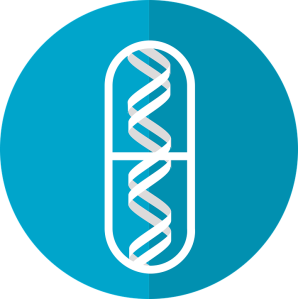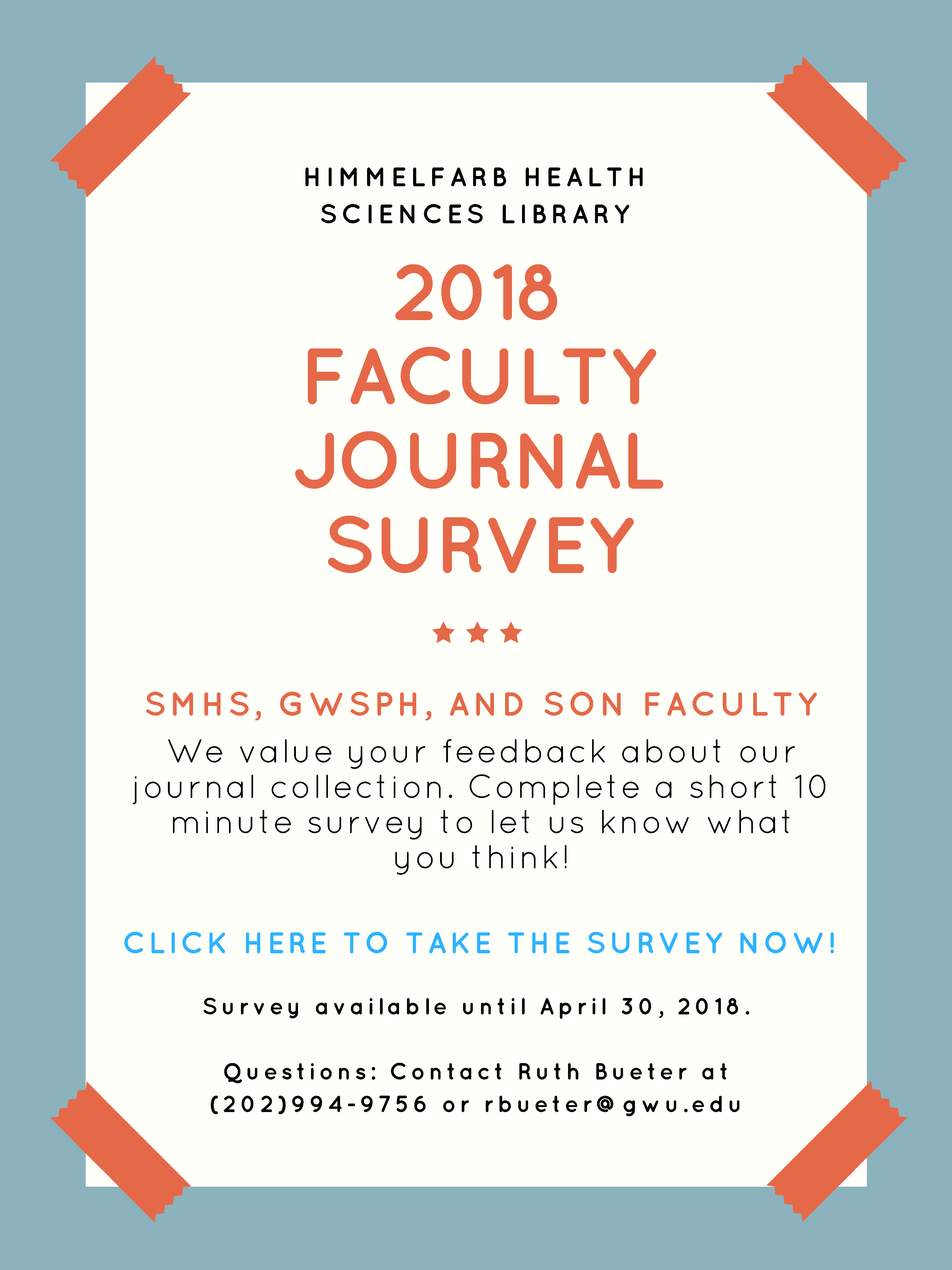Category: Journals
Is multimedia part of your clinical knowledge plan?
 Himmelfarb Library provides access to the latest clinical information via sources such as DynaMed Plus, ClinicalKey, and Lexicomp which complement our extensive journal collection. To enhance learning, users can also take advantage of multimedia content designed to help clinicians, residents and students master skills and test knowledge. Himmelfarb Library's online subscription to the New England Journal of Medicine includes access to:
Himmelfarb Library provides access to the latest clinical information via sources such as DynaMed Plus, ClinicalKey, and Lexicomp which complement our extensive journal collection. To enhance learning, users can also take advantage of multimedia content designed to help clinicians, residents and students master skills and test knowledge. Himmelfarb Library's online subscription to the New England Journal of Medicine includes access to:
- Videos in Clinical Medicine: peer-reviewed presentations which offer expert guidance on performing essential clinical procedures
- Quick Take Videos: animated video summaries of the key takeaways from NEJM’s major research articles
- Interactive Medical Cases: simulated cases designed to test learners on their knowledge of challenging and clinically relevant topics
- NEJM Resident 360: website and discussion platform which offers key knowledge and advice to prepare medical residents for each rotation and their career after residency.
- Instructions: Access NEJM Resident 360 via Himmelfarb Library to create a free personal account. After creating your account, you may access via the library or by direct access to NEJM Resident 360.
Research highlight: EGFR mutations in NSCLC
This month, the Genetics Journal Club features a double-blind randomized clinical trial which compared the use of a third-generation irreversible EGFR-TKI (osimertinib) versus standard therapy (gefitinib or erlotinib) to treat non small-cell lung cancer. You can read the results of this study in the New England Journal of Medicine.
Soria, J. C., Ohe, Y., Vansteenkiste, J., Reungwetwattana, T., Chewaskulyong, B., Lee, K. H., ... & Okamoto, I. (2017). Osimertinib in Untreated EGFR-Mutated Advanced Non–Small-Cell Lung Cancer. New England Journal of Medicine.
To learn more about EGFR mutations in non small-cell lung cancer, explore additional readings from Himmelfarb Library's full-text collection:
- Li, J & Bluth MH. (2017). Pharmacogenomics and Personalized Medicine. From Henry's Clinical Diagnosis and Management by Laboratory Methods. 23rd ed. Elsevier, Inc.
- Shilpa J, Zhang DY, Xu R, Pincus MR & Lee, P. (2017). Molecular Genetic Pathology of Solid Tumors. From Henry's Clinical Diagnosis and Management by Laboratory Methods. 23rd ed. Elsevier, Inc.
- Wagner, H. & Langer CJ. (2016). Non-Small Cell Lung Cancer. from Clinical Radiation Oncology. 4th ed. Elsevier, Inc.
Explore more of Himmelfarb Library's genetics collection by checking out:
Is a cure for hemophilia within reach?
-
-
- van den Berg, H M. (2017). A cure for hemophilia within reach. The New England Journal of Medicine, doi:10.1056/NEJMe1713888 [doi]. Epub ahead of print.
- Porteus, M. (2017). Closing in on treatment for hemophilia B. The New England Journal of Medicine, 377(23), 2274-2275. doi:10.1056/NEJMe1713735 [doi]
- George, L. A., Sullivan, S. K., Giermasz, A., Rasko, J. E. J., Samelson-Jones, B. J., Ducore, J., . . . High, K. A. (2017). Hemophilia B gene therapy with a high-specific-activity factor IX variant. The New England Journal of Medicine, 377(23), 2215-2227. doi:10.1056/NEJMoa1708538 [doi]
[youtube https://www.youtube.com/watch?v=6TpLoZCaL3c]
-
![]() Explore genetics topics via the Genetics Journal Club and Himmelfarb Library's genetics collection by checking out:
Explore genetics topics via the Genetics Journal Club and Himmelfarb Library's genetics collection by checking out:
What is clinical pharmacogenomics?

- Is this drug more effective for individuals with a specific genetic profile?
- Are some people at increased risk of a serious drug reaction from a specific drug?
- How is pharmacogenomic information being used clinically right now?
Pharmacogenomics: Precision Medicine and Drug Response, a new CME review article from the Mayo Clinic Proceedings, explores these issues. This article provides a brief history of pharmacogenomics, information on current clinical applications, and conceptualizes the future of pharmaceogenomics.
This article is available online via ClinicalKey which is part of Himmelfarb Library's online collection. To read more about genetics, check out these full-text e-books in ClinicalKey
- Thompson & Thompson Genetics in Medicine
- Emery's Elements of Medical Genetics
- Emery and Rimoin's Principles and Practice of Medical Genetics
To explore more genetics topics, check out Dr. Charles Macri's online Genetics Journal Club!
What’s the future of women’s health care?
 How will proposed changes to health care law affect women's health in the United States?
How will proposed changes to health care law affect women's health in the United States?
Google Scholar – New Look, Same Great Options
 Google Scholar recently made some interface updates and so may look a bit different, but still offers Himmelfarb Library users some great options to customize the search interface. Many of the customization options are available from the menu in the very upper left portion of the screen (three horizontal lines); the Settings option available there will allow you to:
Google Scholar recently made some interface updates and so may look a bit different, but still offers Himmelfarb Library users some great options to customize the search interface. Many of the customization options are available from the menu in the very upper left portion of the screen (three horizontal lines); the Settings option available there will allow you to:- Search Results: in the Bibliography Manager section, change the 'Show links to import citations into' to RefWorks.
- Library Links: if you're off-campus, search for George Washington and add the full-text links for Himmelfarb Library to improve your access to full-text articles.
Is there a genetic cause for preterm births?
 While evidence has suggested that this is true, the first study identifying specific genetic factors that exist in women with preterm deliveries was just published in the New England Journal of Medicine. This study used data from nearly 50,000 women and identified specific genetic variations which can predict length of gestation and risk of preterm birth.
While evidence has suggested that this is true, the first study identifying specific genetic factors that exist in women with preterm deliveries was just published in the New England Journal of Medicine. This study used data from nearly 50,000 women and identified specific genetic variations which can predict length of gestation and risk of preterm birth.
-
Genetic Associations with Gestational Duration and Spontaneous Preterm BirthZhang, G., Feenstra, B., Bacelis, J., Liu, X., Muglia, L. M., Juodakis, J., ... & Hinds, D. A. (2017). Genetic Associations with Gestational Duration and Spontaneous Preterm Birth. New England Journal of Medicine.
Image citation: Ricciardi, R. (2013). Human genome [online image]. Available at: https://www.flickr.com/photos/ricricciardi/11622986115
Thing you are having a challenging week?
- Hall JM, Lee MK, Newman B, Morrow JE, Anderson LA, Huey B, King MC. Linkage of early-onset familial breast cancer to chromosome 17q21. Science. 1990 Dec 21;250(4988):1684-9. PubMed PMID: 2270482.
- Di Lonardo AM, Darlu P, Baur M, Orrego C, King MC. Human genetics and human rights. Identifying the families of kidnapped children. Am J Forensic Med Pathol. 1984 Dec;5(4):339-47. PubMed PMID: 6441478.
- King MC, Wilson AC. Evolution at two levels in humans and chimpanzees. Science. 1975 Apr 11;188(4184):107-16. Review. PubMed PMID: 1090005.
Can a blood test be used to screen for cancer?
Can a blood test be used to screen for cancer?
This question was addressed in a recent NEJM article which investigated if checking for the Epstein-Barr virus (EBM) in plasma samples would be a useful screening test for nasopharyngeal carcinoma in patients with no symptoms of the disease.
To understand how this prospective study was conducted and learn about the results, read the article or watch the NEJM's quick take video:




